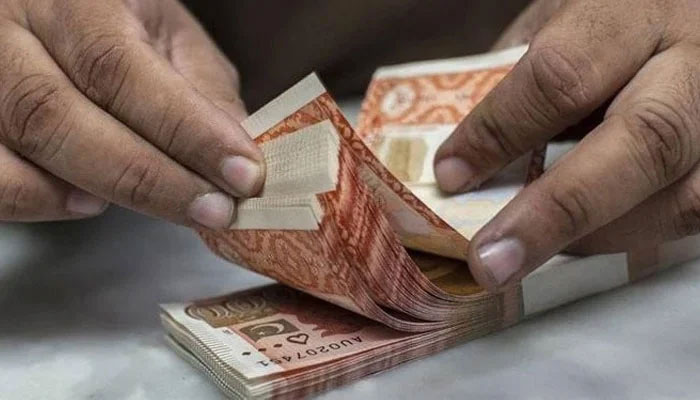Pakistan’s financial inclusion rises to 35%
KARACHI: Financial inclusion in Pakistan has seen a remarkable fourfold increase over the past decade, rising from just 8.0 per cent in 2013 to 35 per cent in 2024, according to the newly released Karandaaz Financial Inclusion Survey (K-FIS) 2024. The survey, launched by Karandaaz Pakistan, provides vital demand-side data and marks 10 years of tracking financial behaviours across the country.
The latest edition of K-FIS attributes much of the growth to the widespread adoption of mobile money, now used by 30 per cent of adults, up from less than 1.0 per cent 10 years ago. However, despite this progress, the report underscores persistent gaps in usage, access, and trust, especially along gender and geographic lines.
Only 14 per cent of women in Pakistan own a full-service financial account compared to 56 per cent of men. Mobile phone ownership also shows a gender divide, with 46 per cent of women owning a mobile phone versus 82 per cent of men, restricting women’s access to digital financial services.
Geographical disparities also remain stark. Punjab (40 per cent), Islamabad (38 per cent) and Gilgit-Baltistan (33 per cent) have advanced significantly, whereas Balochistan (23 per cent) and Azad Jammu & Kashmir (25 per cent) lag behind.
In his remarks, CEO of Karandaaz Waqas ul Hasan said, “There is a persistent and troubling gender divide. Today, 56 per cent of adult men have a registered financial account, compared to just 14 per cent of women. We envision a Pakistan where these divides no longer exist.”
The uptake of the government-backed Raast payment system is also encouraging, with wallet registrations jumping from 17 per cent to 41 per cent in just two years. Users cite speed (77 per cent) and affordability (43 per cent) as key benefits.
Despite digital progress, a staggering 85 per cent of adults still rely on informal credit sources, primarily family and friends. Trust in formal institutions remains low, with only 9 per cent of excluded adults trusting banks and just 8.0 per cent trusting mobile money providers.
Syed Samar Hasnain of the State Bank of Pakistan emphasised the importance of demand-side data for understanding financial behaviours, saying such surveys offer insights not captured by institutional reports. The report calls for gender-responsive product design, deeper digital infrastructure and stronger trust-building efforts to shift from basic account access towards true financial resilience for all Pakistanis.
-
 5 Celebrities You Didn't Know Have Experienced Depression
5 Celebrities You Didn't Know Have Experienced Depression -
 Trump Considers Scaling Back Trade Levies On Steel, Aluminium In Response To Rising Costs
Trump Considers Scaling Back Trade Levies On Steel, Aluminium In Response To Rising Costs -
 Claude AI Shutdown Simulation Sparks Fresh AI Safety Concerns
Claude AI Shutdown Simulation Sparks Fresh AI Safety Concerns -
 King Charles Vows Not To Let Andrew Scandal Overshadow His Special Project
King Charles Vows Not To Let Andrew Scandal Overshadow His Special Project -
 Spotify Says Its Best Engineers No Longer Write Code As AI Takes Over
Spotify Says Its Best Engineers No Longer Write Code As AI Takes Over -
 Michelle Yeoh Addresses 'Wicked For Good' Snub At 2026 Oscars
Michelle Yeoh Addresses 'Wicked For Good' Snub At 2026 Oscars -
 Trump Revokes Legal Basis For US Climate Regulation, Curb Vehicle Emission Standards
Trump Revokes Legal Basis For US Climate Regulation, Curb Vehicle Emission Standards -
 DOJ Blocks Trump Administration From Cutting $600M In Public Health Funds
DOJ Blocks Trump Administration From Cutting $600M In Public Health Funds -
 2026 Winter Olympics Men Figure Skating: Malinin Eyes Quadruple Axel, After Banned Backflip
2026 Winter Olympics Men Figure Skating: Malinin Eyes Quadruple Axel, After Banned Backflip -
 Meghan Markle Rallies Behind Brooklyn Beckham Amid Explosive Family Drama
Meghan Markle Rallies Behind Brooklyn Beckham Amid Explosive Family Drama -
 Scientists Find Strange Solar System That Breaks Planet Formation Rules
Scientists Find Strange Solar System That Breaks Planet Formation Rules -
 Backstreet Boys Voice Desire To Headline 2027's Super Bowl Halftime Show
Backstreet Boys Voice Desire To Headline 2027's Super Bowl Halftime Show -
 OpenAI Accuses China’s DeepSeek Of Replicating US Models To Train Its AI
OpenAI Accuses China’s DeepSeek Of Replicating US Models To Train Its AI -
 Woman Calls Press ‘vultures’ Outside Nancy Guthrie’s Home After Tense Standoff
Woman Calls Press ‘vultures’ Outside Nancy Guthrie’s Home After Tense Standoff -
 Allison Holker Gets Engaged To Adam Edmunds After Two Years Of Dating
Allison Holker Gets Engaged To Adam Edmunds After Two Years Of Dating -
 Prince William Prioritises Monarchy’s Future Over Family Ties In Andrew Crisis
Prince William Prioritises Monarchy’s Future Over Family Ties In Andrew Crisis




